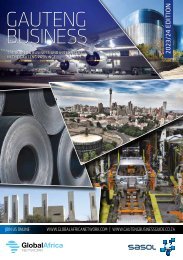South African Business 2019 edition
The 2019 edition of South African Business is the seventh edition of this annual guide to business and investment in South Africa. Regular pages cover all the main economic sectors of the South African economy and give a snapshot of each of the country’s provincial economies. Feature articles on topical issues such as Special Economic Zones and African trade provide unique insights, together with comprehensive overviews of critical economic sectors. Other special features focus on the exciting new possibilities in renewable energy, airports as engines of regional growth and the maritime sector as an entirely new prospect for South African entrepreneurs and businesses. South African Business is complemented by nine regional publications covering the business and investment environment in each of South Africa’s provinces. The e-book editions can be viewed at www.globalafricanetwork.com
The 2019 edition of South African Business is the seventh edition of this annual guide to business and investment in South Africa.
Regular pages cover all the main economic sectors of the South African economy and give a snapshot of each of the country’s provincial economies. Feature articles on topical issues such as Special Economic Zones and African trade provide unique insights, together with comprehensive overviews of critical economic sectors. Other special features focus on the exciting new possibilities in renewable energy, airports as engines of regional growth and the maritime sector as an entirely new prospect for South African entrepreneurs and businesses.
South African Business is complemented by nine regional publications covering the business and investment environment in each of South Africa’s provinces. The e-book editions can be viewed at www.globalafricanetwork.com
You also want an ePaper? Increase the reach of your titles
YUMPU automatically turns print PDFs into web optimized ePapers that Google loves.
SPECIAL FEATURE<br />
Act of 2014 (Act 16 of 2014). The act defines<br />
SEZs as “geographically designated areas of<br />
the country that are set aside for specifically<br />
targeted economic activities, and supported<br />
through special arrangements and systems<br />
that are often different from those that apply<br />
to the rest of the country”. Lower corporate<br />
tax rates and duty-free imports are among the<br />
advantages that accrue to investors.<br />
SEZs come in different forms: <strong>South</strong> Africa<br />
has several existing Industrial Development<br />
Zones (IDZs) and a Free Trade Port (FTP). The<br />
Coega IDZ (Nelson Mandela Bay Metropole)<br />
and the Dube TradePort at the King Shaka<br />
International Airport outside Durban are two<br />
well-known examples.<br />
The most recently licensed SEZ is the<br />
Musina-Makhado SEZ in Limpopo, where the<br />
facility’s strategic location on the border with<br />
Zimbabwe is allied to the strong mineral resource<br />
in the surrounding countryside.<br />
Other licenced IDZs are at Saldanha Bay, East<br />
London and Richards Bay. The Dube TradePort<br />
aims to leverage its proximity to an airport. In<br />
the same way, aerotropolis developments are<br />
mooted for Ekurhuleni (OR Tambo International<br />
Airport) and Cape Town International Airport.<br />
Coega IDZ has attracted huge investments<br />
from a variety of Chinese firms in the engineering,<br />
solar manufacturing and automotive sectors.<br />
This includes an investment from Beijing<br />
Automobile Corporation (BAIC) which took a<br />
65% stake in a multi-billion-rand joint venture<br />
with the Industrial Development Corporation<br />
with the intention of producing 100 000 vehicles.<br />
First Automotive Works (FAW) has a R600-<br />
million assembly plant in Zone 2 at Coega.<br />
Richards Bay (pictured), apart from being<br />
the country’s main site for the export of coal, is<br />
also a registered Industrial Development Zone<br />
(IDZ) and consequently is in a position to attract<br />
investors in a range of sectors. Recent developments<br />
at RBIDZ have seen an investment in<br />
an oil and gas facility and it is hoped that the<br />
ocean will yield finds of gas to provide cheap<br />
feedstock.<br />
The Maluti-A-Phofung Special Economic<br />
Zone takes advantage of the strategic position<br />
Harrismith holds in the Free State’s northeastern<br />
corner. The N3 highway carries huge<br />
volumes of cargo between Gauteng and the<br />
ports of KwaZulu-Natal so it is logical that the<br />
first focus of this SEZ is logistics.<br />
Plans are far advanced for the official recognition<br />
of an SEZ at Upington in the Northern<br />
Cape. The 400ha site of the Upington SEZ is<br />
close to the regional airport and is well served<br />
by access roads. One of the goals is to capitalise<br />
on the existing solar power industry by<br />
promoting special investment packages to<br />
investors in that field, and encouraging the<br />
development of skills and services to support<br />
that sector within the SEZ.<br />
Another type of SEZ is an Export Processing<br />
Zone (EPZ). All of these interventions are intended<br />
to form of broader trade and investment<br />
plans such as National Development Plan<br />
(NDP) and the Industrial Policy Action Plan (IPAP).<br />
The NDP is a broad-strokes plan that seeks to<br />
coordinate development in a range of sectors,<br />
and promotes ambitious infrastructural projects.<br />
<strong>South</strong> Africa’s most recent IPAP has a manufacturing<br />
focus, so beneficiation fits well into<br />
the idea of diversifying and strengthening the<br />
country’s ability to make things.<br />
In the context of the new and burgeoning<br />
renewable energy sector, the state (through the<br />
Department of Trade and Industry, dti) can pass<br />
legislation that requires developers to increase<br />
the level of local content on the solar panels or<br />
wind turbines that are used.<br />
Specific incentives relating to energy savings<br />
and reductions in environmental impact<br />
are available, both from Eskom and the dti.<br />
Within the dti’s Manufacturing Competitiveness<br />
Enhancement Programme, there is a Green<br />
Energy Efficiency Fund, all of which are designed<br />
to make investment more attractive.<br />
37 SOUTH AFRICAN BUSINESS <strong>2019</strong>


















